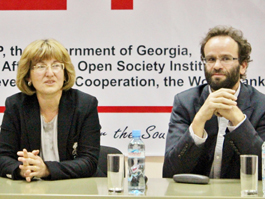Every day at ISET is devoted to teaching and studying, but October 15, 2013 was a day especially dedicated to education issues. ISET introduced its new Human Resources (HR) concentration and hosted Maia Miminoshvili, the Director of the National Examinations Center, in a joint event.
In the first part of the event, Muhammad Asali, the ISET professor coordinating the new concentration and Rusudan Medzmariashvili, a representative of BP Georgia – the donor organization for the new program – gave some background information regarding the HR concentration. BP Georgia has been with ISET since the very beginning and continues to generously support us by funding a specific focus on human resources. As Mrs. Medzmariashvili mentioned, ISET is an exception among BP-funded projects and the organization will continue to support our institution due to ISET’s contribution to Georgia’s future and the evident continuous enhancement of quality. Seven ISET students have already enrolled in the HR concentration.
In the second part of the event, Maia Miminoshvili occupied the floor and told the story of NAEC’s success to ISETers. Beginning as a World Bank project in 1999, the NAEC was established in 2002. Since 2003 the organization conducted large-scale national assessments in various subjects. Its biggest success, the Unified Entrance Examinations (UEE) — which is what the center is most commonly associated with – were launched in 2005. As Mrs. Miminoshvili mentioned, the team working at NAEC, which includes ISET Professor of Mathematics Zaza Tevdoradze, was the primary reason for its success. The NAEC now implements not only the UEE, but also School Leaving, Graduate Record and Teacher Certification Examinations, among others.
While the NAEC is well-known both in and outside Georgia for its examinations, not many Georgians know that the center is involved in conducting international surveys and assessments such as TEDS-M, PISA, TIMSS and PIRLS. And the results and rankings from these surveys are not encouraging. Even so, the ministry of education has for the most part been reluctant to acknowledge these problems and to react to them. The head of the NAEC hopes for changes in the government’s attitude towards solving the problems in the education sector.
A lively discussion on current issues followed Maia Miminoshvili’s presentation. ISETers wanted to know her opinion about new legislative initiatives, teacher qualifications, the overall mission of a university education, and, of course, the openness of the NAEC to the use of their data for education policy analysis. Mrs. Miminoshili enjoyed ISETer’s company and showed a willingness to cooperate in the future.











